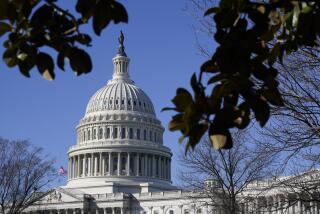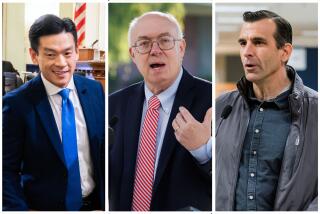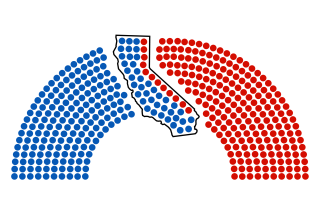Democrats gain big in Legislature
Democrats were within striking distance of a supermajority in the state Senate late Tuesday, and were drawing near in the Assembly as well, moving the party closer to unilateral power to raise taxes.
The potential gains, a result of sweeping changes in California’s political system, captivated the Capitol on a night in which there also were unprecedented battles within the state’s congressional delegation.
If the Democrats achieve a supermajority, as party leaders believed likely, it would mark the first time either party has captured two-thirds of the seats in the Senate or Assembly in 34 years. It takes a two-thirds vote in each house to approve tax increases, which would have to be signed by the governor. Assembly Speaker John A. Pérez (D-Los Angeles) claimed early Wednesday to have achieved a supermajority in his chamber.
The election marked the first statewide test of a new set of election rules, coupled with adoption of new district lines, aimed at reducing partisan gridlock in Washington and Sacramento. The redistricting made many races more competitive and changes in state law pitted the top vote-getters in the June primary against each other, regardless of party.
Democratic leaders said a supermajority would give them greater leeway to solve the state’s economic problems. “With a working two-thirds majority, the Senate can move California forward without running headlong into a recalcitrant minority party who place ideology above balanced solutions that spur job growth,’’ said Sen. Darrell Steinberg (D-Sacramento).
Republicans warned that Californians could be eliminating some of the leverage GOP lawmakers have used to oppose tax increases or extract spending reductions and other concessions in exchange for needed votes to raise taxes. “The power would be given to the very same people who have fought for higher sales taxes, income taxes, gas taxes, soda taxes, diaper taxes, and finding new ways to let convicted criminals out of jail early,’’ said Senate Republican leader Bob Huff of Diamond Bar.
One key was the 17th Senate District, where Democratic Assemblyman William Monning of Carmel was leading Republican school board member Larry Beaman in early returns. Democrats also hoped to pick up one of three other competitive seats to reach the crucial number of 27.
In another critical battle, state Sen. Fran Pavley (D-Agoura Hills) was running behind Republican Todd Zink, a deputy district attorney for Los Angeles County.
Tuesday’s balloting featured a number of unusually close congressional contests that pitted some members of the same party against one another.
In the widely watched battle for a San Fernando Valley congressional seat, Rep. Brad Sherman of Sherman Oaks was leading fellow Democratic Rep. Howard Berman of Valley Village. And in another same-party contest, Rep. Janice Hahn (D-San Pedro) was besting Rep. Laura Richardson (D-Long Beach) in a newly drawn district that includes many minority, working-class communities.
Rep. Lois Capps (D-Santa Barbara), viewed as one of the Democrats’ most vulnerable House members in California, defeated Republican former lieutenant governor and state lawmaker Abel Maldonado of Santa Maria.
In some of the tightest races for Congress, Rep. Brian P. Bilbray (R-Carlsbad) was fending off Democrat Scott Peters, a San Diego environmental attorney, early returns showed. Democratic emergency room physician Raul Ruiz was narrowly trailing Rep. Mary Bono Mack (R-Palm Springs) in the Inland Empire.
Tuesday marked the first general election under the new rules. “The whole terrain has shifted,” USC political scientist Sherry Bebitch Jeffe said. “What we now have are a great number of competitive districts but also a level of nastiness in campaigns that I have not seen before — and some of the most expensive races ever” for Congress and the Legislature.
Voting districts drawn last year by a citizens commission, along with shifting state demographics, led to competitive races in many areas that had once been safe for incumbents or a dominant party.
Congressional Democrats and Republicans battled for at least 10 of California’s 53 congressional seats as part of their fight for control of the House of Representatives.
The national parties and outside groups spent more than $53 million in congressional contests around the state, dwarfing what candidates were able to garner.
Overall, races for the Legislature featured record spending — more than $20 million — by outside groups.
In Southern California, the hottest congressional contests included Democrats’ efforts to expel Bono Mack and Bilbray from their posts in Riverside and San Diego counties.
Republicans set aside their differences with Maldonado over his 2009 vote, as a state senator, to raise taxes in a budget deal and rallied behind his effort to defeat Capps. She is a moderate whose remapped district went from safely Democratic to closely divided.
The new open primary system, which sends the top two finishers to a November contest regardless of party affiliation, produced 28 congressional or legislative matchups featuring two Republicans or two Democrats.
At least $13 million poured into the bitter, widely watched contest between congressional veterans Berman and Sherman, whose similar voting records left little to set them apart.
Sherman had a big advantage in the new 30th District, however. More than half his old district overlapped it.
The intraparty fight between Richardson and Hahn in the 44th District in southeast Los Angeles County drew special attention from California’s African American congressional delegation.
Members worried that their ranks would shrink to three with a defeat of Richardson, who is black.
The lower house of the Legislature also had its share of hard-fought contests.
In Los Angeles, City Councilman Richard Alarcon, running for the Assembly while awaiting trial on felony charges of voter fraud and perjury, was losing in early returns to fellow Democrat Raul Bocanegra, a legislative aide.
Bocanegra criticized Alarcon, a former state senator, over his legal troubles in their fight for the 39th Assembly District.
Prosecutors allege that Alarcon, who has pleaded not guilty, lied about where he lived so he could run for the City Council post.
More to Read
Start your day right
Sign up for Essential California for news, features and recommendations from the L.A. Times and beyond in your inbox six days a week.
You may occasionally receive promotional content from the Los Angeles Times.








